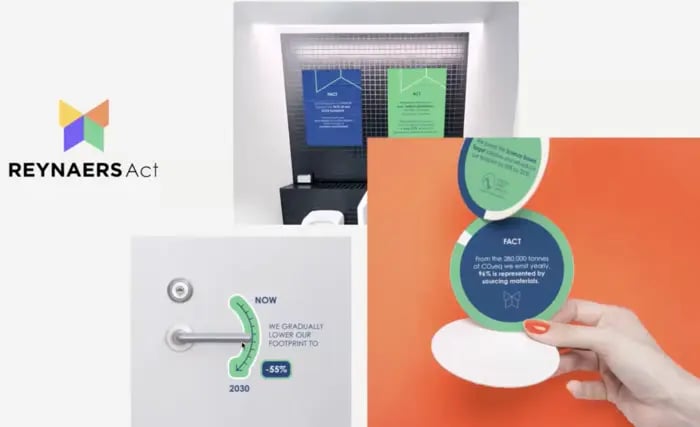How to Introduce Sustainability into Your Workforce

Together with bigtrees we discussed real-life customer stories and use cases of how different companies have successfully and originally introduced sustainability-focused initiatives and projects within their workforce to engage them in their efforts and reach a gradual and full transformation.
Why is sustainability so important today?
According to the CAT (climate action tracker), current climate policies will have the planet reach +2.9°. Today we are between +1.1° and +1.2° of global warming, and it’s already causing 10 million deaths per year. On top of that, it’s created a tragic scenario for businesses, too, with €190 billion in economic loss and a dramatic crop loss in agriculture.
So that’s why sustainability is the most important economic driver of the coming decade.
The EU has set an ambitious reduction target of reaching -55% in reduction by 2030 (compared to the 1990s) and becoming climate neutral by 2050. What this means is that if you’re setting climate targets as a company, they should be more ambitious than those of the European Union, otherwise, they are not worth communicating at all.
What is very important for businesses is the comprehensive green deal put in place by the EU. It states that the policies and decisions of the commission on whether to assign and distribute subsidies are directly linked to the targets each company sets itself, and more particularly on whether or not they are compliant with the Green Deal.
Another important element in this context is that of truthful communication. Claiming anything about being sustainable, biological, or ‘good for the climate’ without proof is now forbidden. There is a taxonomy that determines what the language and communication you use actually mean: in other words, whenever a company wants to make a claim about sustainability, it has to be fact-checked and approved in line with the taxonomy.
The good news is that sustainability is very important for European citizens: many organizations are convinced that we still need to spend time convincing people of how important sustainability is, but a research of the European Barometer shows that 93% of the EU population is convinced that climate change is one of the biggest 3 issues and challenges of today.
Moreover, Capgemini's research found that 79% of consumers have already changed their buying behavior because of sustainability reasons. More and more people are choosing smaller brands if their sustainability promises are more truthful and help them live a more sustainable lifestyle. And this is true most of all for young people – younger generations (Millennials, Gen Z, and X) are driven by sustainability in their consumer behavior and choices.
Watch the full webinar FOR FREE
Get the recordingWe have to act
Why is it so important that all the people inside your company are involved in your sustainability strategy?
The European Commission launched the CSRD (Corporate Sustainability Reporting Directive): it is now an obligation for companies to communicate about their sustainability performance on the same level of finance reports, for example. Reports have to be truthful and data-based, and they have to be compliant with the European reporting standards and framework.
Who is subjected to the CSRD? Every company with more than 250 employees, 40M turnover, and/or 20M in assets. If you fall under at least 2 of these 3 parameters, then you have to report on your sustainability performance according to the CSRD.
Today about 12.000 companies in Europe are directly bound to the CSRD, and 50.000 companies are indirectly linked because they are suppliers and partners of those.
According to CSRD, all measures relating to Carbon footprint, emissions, transport, value chain, waste, water, human rights, and employee satisfaction are to be reported on.
Based on this framework, it should be clear that to make this CSRD-compliant report and turn your business into a more sustainable one, you will need all of your teams, blue and white collars alike.
Businesses have to change
Suppose that you are a company that is active in construction, producing office furniture, and designing working spaces. One of the things you might consider is turning your business from linear to circular. But if you want to do that, it’s not only a marketing or sales decision:
- You will have to involve your designers. If you wanna make circular chairs, you will have to design them so that they can be circular, so you need to motivate your designers.
- You will need to motivate your buyers. If you need to adapt the supply chain and source more sustainable raw materials, you will need your buyers’ support and effort.
- You will need your IT department. If you wanna make sure that at the end of the lifetime of your sustainable chair, the materials actually come back to you, you have to motivate ITers because all the data has to be logged in some kind of database to know where the materials are.
- You will need logistics and operations. Normally you would throw waste in the trash, but now you have to store it for future use to make sure that the system is circular.
- You will need blue-collar workers. You want to make sure that they are dismantling everything the right way.
- You will need marketing and sales. All teams inside a company will have to work together to make sure you’re telling the right story for a more sustainable business.
Motivate your employees and involve them in your sustainability strategy
Discover AmbassifyHow companies are already engaging their workforce for sustainability
Marks & Spencer is a large British retailer that launched a campaign called ‘Look behind the label’: they wanted to make their clothing more sustainable and encourage people to look behind the label, that is, to look at what their clothing was made of.
They trained all of their employees in sustainable fashion: they saw a huge success because then everyone in the company was able to talk about, source, and work with more sustainable materials and items of clothing.
It was such a success that they launched a more comprehensive campaign, “Plan A (because there is no Plan B)”. Their goal was to improve carbon literacy across their business and give colleagues a greater understanding of the emissions associated with how they source, make, and move their products. Their target was to reach Net Zero by 2040, so 10 years before the EU.

Launching Plan A has saved M&S £750 million in costs over the last 10 years. So not only are they on track with the climate change target, not only do they have higher employee satisfaction rates, but they also have huge cost savings.
Reynaers Aluminum launched a campaign with the help of bigtrees. They had to reduce emissions, but in their case, the emissions reside in the making of the raw material: aluminum.
What they needed was to get all of their teams engaged in this and educate them. They launched an online version of the campaign through their internal communications, primarily focused on their white-collar workers, and an offline version for the blue collars:

- Toilet posters. They showed facts – what their challenges in sustainability were — and how they are gonna act on this.
- Coasters in the cafeteria. They showed and let them know how they could get involved in this as a white or blue-collar employee.
- Door handles and stickers. They showed how much of their emissions they would eliminate.
All of this communication was used to invite employees into the Reynars Academy, a place that trained people in sustainability and how they can be a force inside the company and contribute to the company’s sustainable efforts (from commuting to purchasing behavior, etc.).
Sustainability truly is the most important topic for the coming 10 years, we need to act fast and be serious about sustainability. And this cannot be done without engaging all of your employees and all of your teams in building a more sustainable business.